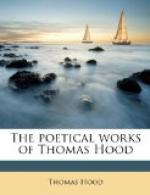Thus reading on—the longer
They read, of course, their childish faith grew stronger
In Gnomes, and Hags, and Elves, and Giants grim,—
If talking Trees and Birds revealed to him,
She saw the flight of Fairyland’s fly-wagons,
And magic fishes swim
In puddle ponds, and took old crows for dragons,—
Both were quite drunk from the enchanted flagons;
When as it fell upon a summer’s day,
As the old man sat a feeding
On
the old babe-reading,
Beside his open street-and parlor door,
A
hideous roar
Proclaimed a drove of beasts was coming by the way.
Long-horned, and short, of many a different breed,
Tall, tawny brutes, from famous Lincoln-levels
Or
Durham feed;
With some of those unquiet black dwarf devils
From
nether side of Tweed,
Or
Firth of Forth;
Looking half wild with joy to leave the North,—
With dusty hides, all mobbing on together,—
When,—whether from a fly’s malicious
comment
Upon his tender flank, from which he shrank;
Or
whether
Only in some enthusiastic moment,—
However, one brown monster, in a frisk,
Giving his tail a perpendicular whisk,
Kicked out a passage through the beastly rabble;
And after a pas seul,—or, if you will,
a
Horn-pipe before the basket-maker’s villa,
Leapt
o’er the tiny pale,—
Backed his beefsteaks against the wooden gable,
And thrust his brawny bell-rope of a tail
Right
o’er the page,
Wherein
the sage
Just then was spelling some romantic fable.
The old man, half a scholar, half a dunce,
Could not peruse,—who could?—two
tales at once;
And
being huffed
At what he knew was none of Riquet’s Tuft;
Banged-to
the door,
But most unluckily enclosed a morsel
Of the intruding tail, and all the tassel:—
The
monster gave a roar,
And bolting off with speed increased by pain,
The little house became a coach once more,
And, like Macheath, “took to the road”
again!
Just then, by fortune’s whimsical decree,
The ancient woman stooping with her crupper
Towards sweet home, or where sweet home should be,
Was getting up some household herbs for supper;
Thoughtful of Cinderella, in the tale,
And, quaintly wondering if magic shifts
Could o’er a common pumpkin so prevail,
To turn it to a coach;—what pretty gifts
Might come of cabbages, and curly kale;
Meanwhile she never heard her old man’s wail,
Nor turned, till home had turned a corner, quite
Gone
out of sight!
At last, conceive her, rising from the ground,
Weary of sitting on her russet clothing,
And
looking round
Where
rest was to be found,
There was no house—no villa there—no
nothing!




